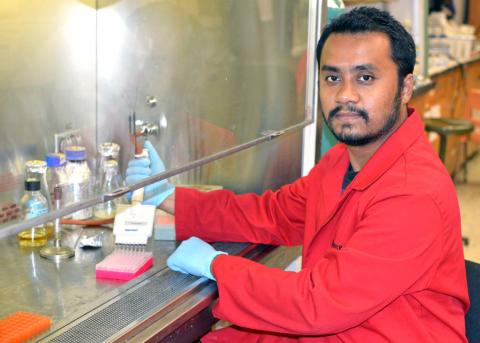Biology research highlight: How burrowing shrimp can help clean up oil spills
Biology PhD student Nihar Deb Adhikary is working on research to determine how ghost shrimp and stout razor clams, which burrow in the Gulf of Mexico, are helping to degrade oil in coastal marshes and beaches following the 2010 Deepwater Horizon oil spill. His research is made possible in part by a grant from the Gulf of Mexico Research Initiative.
Biology research projects at UL Lafayette often focus on the Gulf of Mexico and Louisiana’s coastline, with a special emphasis on the wildlife and plant life there. Because of the University’s proximity to the Gulf, professors and graduate students are often working on beaches and boats to collect samples and observe these plants and wildlife. Since 2010, a large part of the graduate programs’ work has been on oil spill research.
 Nihar, along with professors Dr. Paul Klerks and Dr. Andrei Chistoserdov, is researching to assess how bioturbators (worms, clams, shrimp, and crabs) can alter the physical and chemical properties of coastal marsh and beach sediment. He’s recreated the Gulf’s sediment conditions in large tanks housed in a greenhouse, allowing him to observe what happens when he introduces crude oil to the bioturbators’ environment. Then they wait for 10 days, after which they measure the amount of oil in the water and sediment.
Nihar, along with professors Dr. Paul Klerks and Dr. Andrei Chistoserdov, is researching to assess how bioturbators (worms, clams, shrimp, and crabs) can alter the physical and chemical properties of coastal marsh and beach sediment. He’s recreated the Gulf’s sediment conditions in large tanks housed in a greenhouse, allowing him to observe what happens when he introduces crude oil to the bioturbators’ environment. Then they wait for 10 days, after which they measure the amount of oil in the water and sediment.
Nihar and his team have found that the ghost shrimp activity aided in degrading naphthalene, which is the simplest polycyclic aromatic hydrocarbon, or PAH. PAHs are a group of more than 100 different chemicals that are released from burning oil. Nihar has found the ghost shrimp’s natural burrowing movement adds organic matter to the sediment and allows oxygen to further penetrate, stimulating microorganisms’ growth and enhancing the microbial oil degredation.
Nihar told the Gulf of Mexico Research Initiative, “Both the laboratory work and the field sampling helped me understand the value of collaboration. Reaching out to other researchers at GoMRI meetings has broadened my insights into my own project and oil spill research as a whole.” He also added the skills and experience he has gained from them will help him with future research.
“I believe I am working in a great program with great people at UL Lafayette,” he said. “It is like a small family to me, providing me with a home away from home.”
Photo courtesy of Suchandra Hazra.
